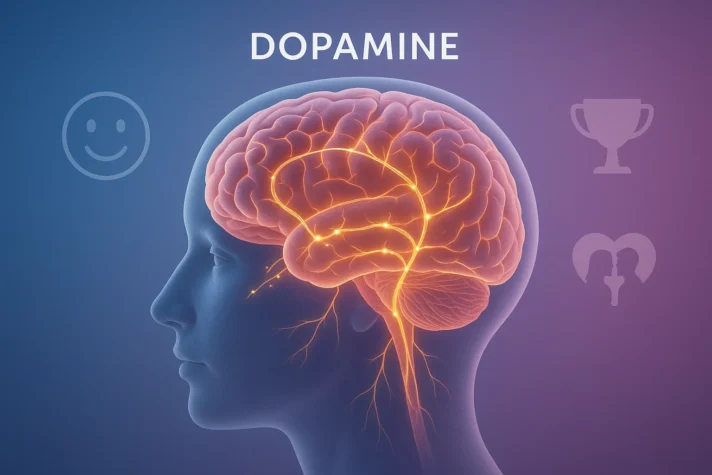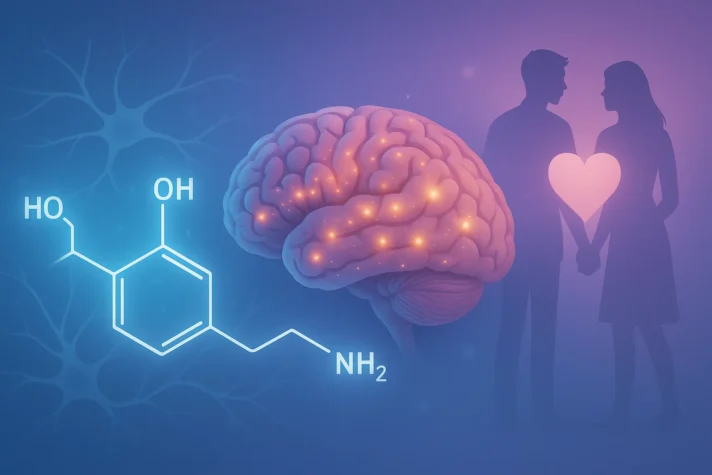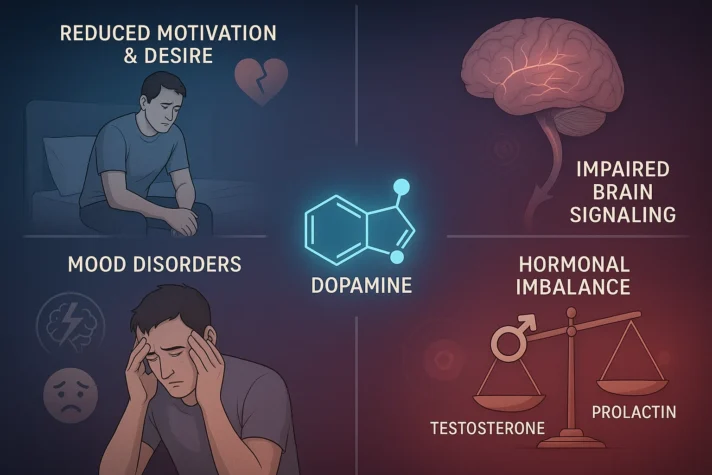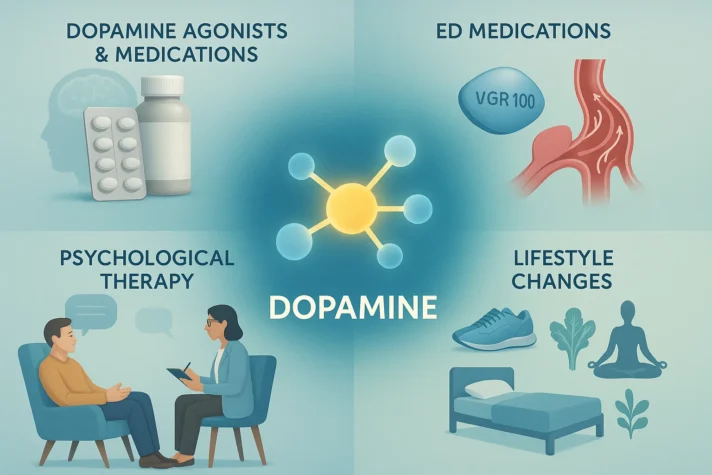Dopamine and Erectile Dysfunction & Sex: Link Between and Sexual Behaviour

Yes, low dopamine can cause erectile dysfunction (ED). Dopamine is a key brain chemical that controls motivation, pleasure, and sexual desire. When dopamine levels drop, it reduces sexual drive and makes arousal more difficult, which can affect the ability to get or maintain an erection. Low dopamine also disrupts brain signaling needed for erections and may raise prolactin, lowering testosterone, a vital hormone for sexual health. In addition, depression, stress, and anxiety linked to low dopamine further increase ED risk. Addressing dopamine imbalance may improve both erectile function and overall sexual well-being.
When most men think about erectile dysfunction, they imagine blocked arteries, stress, or even aging. But what if the real culprit sometimes isn’t in the body at all but in the brain’s chemistry? This can be a brain wiring glitch. Let me explain how? This one tiny chemical called dopamine is actually responsible for the brain’s good signal to all parts of the body. It is also responsible for improving your sexual performance. Low levels don’t just make you feel low, but they can also dim the spark in your relationships.
In this article, we’ll take a closer look at how low dopamine can cause erectile dysfunction, and why this chemical in your brain is so important when it comes to sexual function.
Dopamine is often called the “feel-good” chemical because it affects mood, motivation, and even sexual desire. When your dopamine levels are low, it doesn’t just mess with how you feel emotionally; it can also make it harder to get and keep an erection.
Understanding the connection between dopamine and erectile dysfunction is key to seeing how improving dopamine levels might help with sexual health. By exploring how dopamine works in the body, we can better understand how fixing dopamine imbalances could be a solution for ED and improve overall sexual well-being.
What Is Dopamine and Its Role in Sexual Function?
Dopamine is a chemical messenger, or neurotransmitter (a chemical messenger of the brain and nervous system), that plays an important role in a variety of bodily functions [1].
New research shows that dopamine brain cells have different jobs, and this also ties into sex. Some cells push us to chase pleasure and learn from rewarding experiences like sexual desire and enjoyment. Others keep us alert and focused, which helps with arousal and staying engaged during sex. With quick signals boosting both systems, they work together to guide sexual motivation, performance, and overall satisfaction.[2] [3]
When it comes to sexual health, dopamine plays an important role in regulating sexual arousal, desire, and motivation.
Dopamine isn’t just about feeling good; it’s the switch that turns on your sexual motivation. If it’s low, both desire and erections can take a hit.”
It activates the brain’s reward system and promotes the feelings of pleasure related to sexual experiences. It also helps in the release of other important hormones that are involved in sexual function.
But when dopamine levels are low, it can have a major impact on sexual function, leading to problems like erectile dysfunction (ED). But how exactly does this happen? Let’s dive deeper into this connection.

How Does Low Dopamine Lead to Erectile Dysfunction?
The link between dopamine and erectile dysfunction is complex, involving both physical and psychological factors. Here’s how low dopamine levels can affect sexual health and lead to ED:
1. Reduced Sexual Motivation and Desire
- You now know that Dopamine is a key player when it comes to sex because it drives both motivation and pleasure.
- When your dopamine levels dip, your sex drive often dips too. You may not feel the same desire, and that lack of motivation can make it harder to get aroused.
- Without enough dopamine pushing things forward, the brain doesn’t send the right signals to start or maintain an erection.
- This can leave men feeling frustrated and struggling to perform. In fact, low sexual motivation is one of the most common signs of dopamine deficiency, and it’s a direct reason why some men experience ED.
2. Impaired Brain Signaling and Sexual Response
- Dopamine isn’t just important for our mood and mental energy; it also plays a key role in getting an erection.
- It helps trigger the release of other chemicals, like nitric oxide, that are needed for sexual function. Nitric oxide relaxes the blood vessels in the penis, allowing blood to flow in and create an erection.
- When dopamine levels are too low, it can mess with how the brain and body communicate.
- This can make it harder to get or keep an erection during sex. In simple terms, low dopamine can make it harder for the body to respond to sexual signals.
3. Mood Disorders and Anxiety Impact Sexual Health
- Low dopamine is often linked to mental health issues like depression, anxiety, and stress, which can also increase the risk of erectile dysfunction (ED).
- When someone is depressed, it can lower their sex drive or libido and make them feel tired, making it harder to get in the mood for sex.
- Feeling anxious about sexual performance or worrying about not being able to perform can make ED worse.
- This creates a cycle where stress and anxiety lower dopamine levels, which in turn makes sexual problems even worse.
4. Hormonal Imbalances Linked to Low Dopamine
- Dopamine also helps control other hormones that affect sex drive and performance.
- One of these hormones is prolactin [4], which affects how much testosterone your body makes.
- When dopamine levels are low, prolactin can increase, which can lower testosterone production.
- Testosterone is a key hormone for sexual desire and the ability to get and keep an erection. So, if dopamine levels drop and testosterone decreases, it can directly lead to erectile dysfunction (ED).
- This imbalance can make you feel less interested in sex and make it harder to maintain an erection.
Can Low Dopamine Be Treated to Improve Erectile Dysfunction?
The good news is that low dopamine and erectile dysfunction can often be treated, and addressing the dopamine imbalance might help improve sexual function. Here are some ways to treat low dopamine levels and manage ED:
1. Dopamine Agonists and Medications
- In some cases, doctors may prescribe medications called dopamine agonists, which work by mimicking the effects of dopamine.
- These drugs can help boost dopamine activity in the brain, which may improve sexual desire and help with erectile function.
- For men with erectile dysfunction (ED) caused by low dopamine, medications like pramipexole [5] and ropinirole [6] are sometimes prescribed.
- These drugs are often used to treat Parkinson’s disease, a condition where dopamine levels are low. However, they can also help improve sex drive and performance.
2. Erectile Dysfunction Medications
- The traditional medications for ED, such as sildenafil (Viagra) and tadalafil (Cialis), can also be used to improve blood flow to the penis, making it easier to achieve and maintain an erection.
- These medications work independently of dopamine but can be effective in managing erectile dysfunction caused by a dopamine imbalance.
3. Psychological Therapy
- Since low dopamine is often connected to mental health issues like depression and anxiety, therapy can be really helpful for treating erectile dysfunction (ED) and can even improve your mental health.
- Talking therapies, like Cognitive Behavioral Therapy (CBT) [6], can help express the emotional and mental factors that contribute to sexual problems.
- Therapy can help reduce stress, anxiety, and feelings of depression, which might help bring dopamine levels back to normal.
- As a result, this can improve sexual desire and performance. Tackling these emotional issues is an important part of finding long-term solutions to ED.
4. Lifestyle Changes
- Taking care of your overall health can help boost dopamine levels, too.
- Regular exercise, eating a healthy diet, and getting enough sleep all support better dopamine production.
- Also, reducing stress and using relaxation techniques like yoga or meditation can help keep your dopamine levels in balance.
- This can all lead to better mental and physical well-being, including improved sexual health.
Conclusion
Yes, low dopamine can play a role in erectile dysfunction (ED). Dopamine is important for things like sexual desire, arousal, and the physical reactions needed for an erection. When dopamine levels are low, it can reduce sex drive, interfere with the brain’s signals for an erection, and contribute to mood problems that affect sexual health.
However, some treatments can help, such as medications that boost dopamine, ED drugs, therapy, and healthy lifestyle changes. These can help manage the effects of low dopamine and improve erectile function.
If you’re dealing with ED because of low dopamine, it’s important to talk to a doctor. They can help find the right treatment for you based on your specific situation.
"The following blog article provides general information and insights on various topics. However, it is important to note that the information presented is not intended as professional advice in any specific field or area. The content of this blog is for general educational and informational purposes only.
Book consultation
The content should not be interpreted as endorsement, recommendation, or guarantee of any product, service, or information mentioned. Readers are solely responsible for the decisions and actions they take based on the information provided in this blog. It is essential to exercise individual judgment, critical thinking, and personal responsibility when applying or implementing any information or suggestions discussed in the blog."








